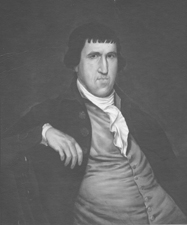Benjamin Goodhue
| Benjamin Goodhue | |
|---|---|
 |
|
|
United States Senator from Massachusetts |
|
|
In office June 11, 1796 – November 8, 1800 |
|
| Preceded by | George Cabot |
| Succeeded by | Jonathan Mason |
| Member of the U.S. House of Representatives from Massachusetts's 10th district |
|
|
In office March 4, 1795 – June 11, 1796 |
|
| Preceded by | District created |
| Succeeded by | Samuel Sewall |
| Member of the U.S. House of Representatives from Massachusetts's 1st district |
|
|
In office March 4, 1793 – March 3, 1795 Serving with Fisher Ames, Samuel Dexter, and Samuel Holten (General ticket) |
|
| Preceded by | Fisher Ames |
| Succeeded by | Theodore Sedgwick |
| Member of the U.S. House of Representatives from Massachusetts's 2nd district |
|
|
In office March 4, 1789 – March 3, 1793 |
|
| Preceded by | None |
| Succeeded by |
Dwight Foster Theodore Sedgwick Artemas Ward William Lyman (General ticket) |
| Personal details | |
| Born |
September 20, 1748 Salem, Massachusetts |
| Died | July 28, 1814 (aged 65) Salem, Massachusetts |
| Political party | Federalist |
| Alma mater | Harvard College |
| Occupation | Merchant |
Benjamin Goodhue (September 20, 1748 – July 28, 1814) was a Representative and a Senator from Massachusetts. He supported the Patriot during the American Revolution, and was a strong member of the Federalist Party. He was described by contemporaries as a leading member of the so-called Essex Junto, a group of Massachusetts Federalists, most of whom were from Essex County.
Benjamin Goodhue was born in Salem, Massachusetts to Benjamin and Martha (Hardy) Goodue. His father was a blacksmith by trade, but later became a successful merchant. The younger Benjamin graduated from Harvard College in 1766 and joined his father in the merchant business. He remained active as a merchant during the American Revolutionary War, and was a member of the state constitutional conventions of 1779 and 1780, the latter one producing the present Constitution of Massachusetts. He then won election as a state representative to the inaugural Massachusetts House of Representatives in 1780, and was later elected to the state senate, serving in 1783 and 1786-1788. After adoption of the United States Constitution, Goodhue was elected to the First and to the three succeeding Congresses and served from March 4, 1789, until his resignation in June 1796.
Goodhue was a supporter of the strong central government, and joined the Federalist Party when it was organized. He was one of a number of prominent Federalists from Essex County that were described by John Hancock as the "Essex Junto". He was one of two Congressmen who drafted the nation's first revenue code. He served as chairman of the Committee on Commerce and Manufactures in the Fourth United States Congress. He was elected in 1796 to the United States Senate, filling a vacancy caused by the resignation of George Cabot. He was reelected and served from June 11, 1796, to November 8, 1800, when he resigned and retired from public service. He died in Salem on July 28, 1814.
...
Wikipedia
